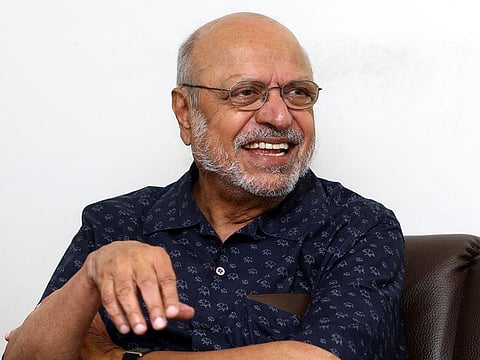Shyam Benegal: Pioneer of India's cinematic Renaissance
The filmmaker redefined Indian cinema with realism, artistry, and profound storytelling

I wasn’t even thirteen when I saw Shyam Benegal’s Ankur (1974). It blew my mind. After films like Bobby, Yadon Ki Baarat, Zanjeer, and Roti Kapda aur Makaan, released around the same time, Ankur, which means sapling, was like a breath of fresh air. True to its name, it seeded what came to be known as the “parallel cinema.”
So different from the fantasies and melodramas of Bollywood’s dream factories, the staple diet of song and dance and tearjerking romances, fodder for the common man trying to escape from his grim daily grind. Also different from the grimy, depressing, boring, and ever-so-slow alternative cinema of Leftists like Mrinal Sen and Kumar Sahani.
Ankur was a gripping story, shot on location, with a powerful, but subtle social message. The peasant underdog, represented by a little boy, does raise his hand to throw a stone at the dashing, sleazy, and exploitative landlord, so brilliantly played by Anant Nag. But the message is secondary to the story, which is well crafted and developed. The colour and aesthetic values are also slick, if not lavish, a throwback to Benegal’s days as a leading ad-man with Blaze.
Not just Nag, Ankur launched some of the greatest actors of Hindi cinema including Shabana Azmi, Naseeruddin Shah, and Smita Patil. He also made Amrish Puri famous. Puri played the villain in Nishant, Benegal’s follow-up hit. Puri became Bollywood’s favourite baddie, going on to act in some 450 films till he passed away three decades later in 2005.
Ankur and Nishant were followed by Manthan (1976), which cast Naseeruddin Shah in the title role as a dairy farmer in Gujarat. The movie was produced by Federation of Milk Cooperatives, better known by their iconic brand, Amul. Manthan, which means churning, was not just critique of India’s class and capitalist system, but a story of hope and transformation. Bhumka (1977), featuring Smita Patil, was based on the life of the famous Marathi cine artiste, Hansa Wadkar, as narrated in her autobiography, Sangte Aika.
These four films, released in rapid succession, marked the golden phase of Benegal’s career. They also established him as a major film maker, quite deserving of the highest honour, the Dadasaheb Phalke Award, which he received later, in 2005. Several notable productions such as Mandi, Mammo, Sardari Begum, and Zubeidaa, followed, all of them meticulously scripted and directed, with memorable performances. But they didn’t quite reach the artistic or energetic impact of his opening tetralogy.
Born on Dec. 14, 1934, in Hyderabad, Shyam Benegal didn’t just direct films; he orchestrated a movement — an era where cinema was not just entertainment but a profound exploration of the human condition, societal norms, and the complex interplay of tradition and modernity. Realism combined with visual poetry in Benegal’s films, stirring the audiences into thinking and engaging with their social reality. The music in his movies was also memorable.
Apart from movies, Benegal made documentaries and TV serials. His bio-documentary on Satyajit Ray is an example of the former and Bharat Ek Khoj, based loosely on Jawaharlal Nehru’s Discovery of India, a multipart Doordarshan serial, of the latter. This was an epic exploration of the India’s past, its history, culture, philosophy, and civilisation. Neither political propaganda nor mere regurgitation of facts, the series was an educative and narrative masterpiece, brining to the small screen a panoramic view of India’s vast past, encapsulating the essence of India through its diverse historical epochs.
I knew Benegal Sahab slightly. He readily responded to my invitation to inaugurate the Indo-Chinese film festival that I helped organise on behalf of the China-India Intercultural Dialogue. He flew in from Mumbai in economy class, stayed at the India International Centre, the venue of the event, delivered the Keynote Address, and interacted with the delegates with an ease and naturalness which were rare. He was totally unaffected and down-to-earth, albeit somewhat reserved and hard to draw out.
His demise on Dec. 23, 2024, has left an irreplaceable void in the Indian film industry, but his legacy is one of enduring influence and inspiration. Benegal believed in cinema’s potential to provoke thought, stimulate debate, and perhaps even nudge society towards introspection and change. Not just social commentary, he also dabbled in humour and satire as in Mandi and Welcome to Sajjanpur.
His legacy lives on not only in honours like the Padma Bhushan but in his unique cinematic style and the manner in which he opened the hearts and touched the minds of his audiences. As we bid farewell to this cinematic giant, we are reminded of the power of film to mirror society, to question, and to inspire. Shyam Benegal’s films will continue to be studied, celebrated, and most importantly, felt by those who seek to understand the intricate mosaic that is India. His vision will guide future filmmakers, his narratives will educate generations to come, and his spirit will forever be a part of Indian cinema’s soul.
In remembering Shyam Benegal, we honour not just a filmmaker but a visionary who captured the essence of humanity in his frames, making us laugh, cry, and most importantly, think. His journey from a young boy sneaking into film screenings to becoming the architect of a cinematic revolution will forever be a testament to the transformative power of art.
Thank you, Shyam Babu, for the stories, the lessons, and the legacy. Your films are not just a part of our cultural heritage. They are a beacon for what cinema can and should aspire to be. Rest in peace, knowing your light continues to guide us.
Sign up for the Daily Briefing
Get the latest news and updates straight to your inbox


